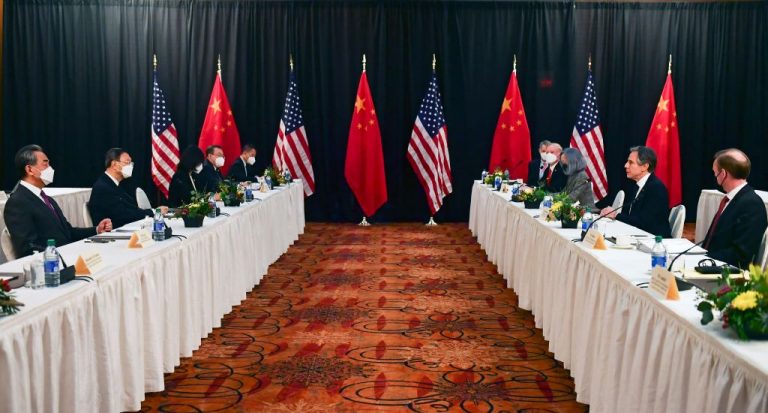As the whole world watches with bated breath how the invasion of Ukraine unfolds, China is cautioning against the U.S. trying to build a “Pacific version of NATO” and has again warned that Washington’s ongoing support of self-ruling Taiwan could result in “unbearable consequences.”
China’s Foreign Minister Wang Yi said during a daily press briefing yesterday (March 7) that the “real goal” of the United States’ plans in the Indo-Pacific region was to develop Asia’s response to NATO, according to Bloomberg.
“The perverse actions run counter to the common aspiration of the region for peace, development, cooperation and win-win outcomes,” Wang said. “They are doomed to fail.”
Ongoing dispute over Taiwan
Wang repeatedly alluded to the U.S. as being the source of problems within the international community, and issued some of Beijing’s most pointed warnings yet against warming diplomatic ties between Washington and Taipei.
READ MORE:
- Beijing’s Support for Russia Is Endangering Chinese People in Ukraine
- Former Secretary of State Mike Pompeo Arrives in Taiwan, Calling It a ‘Great Nation’
- Russian Invasion of Ukraine Casts an Ominous Shadow Over Taiwan
“This would not only push Taiwan into a precarious situation, but will also bring unbearable consequences for the U.S. side,” Wang said on the sidelines of the National People’s Congress in Beijing, later adding: “Taiwan will eventually return to the embrace of the motherland.”
Success
You are now signed up for our newsletter
Success
Check your email to complete sign up
Taiwan, officially known as the Republic of China (ROC), once governed all of China before being forced off the mainland by communist rebels, who founded the People’s Republic of China (PRC) in 1949.
Beijing does not recognize either the ROC or an independent Taiwan, insisting that any country wishing to pursue diplomatic relations with it must first break official ties with Taipei under its One-China policy. This, in addition to Taiwan’s expulsion from the U.N. half a century ago, has resulted in the island being isolated from the global community.
Though Beijing has indicated its preference for a peaceful “reunification,” it does not rule out military force and has vowed to claim Taiwan by any means necessary. The mainland regime also views Taiwan as a renegade province that must be “returned to the homeland,” and has repeatedly threatened military action against any countries that defend its sovereignty.
Beijing to send aid to Ukraine
“Some, while being vocal about the principle of sovereignty on the Ukrainian issue, have kept undermining China’s sovereignty and territorial integrity on the Taiwan question — this is a blatant double standard,” Wang said.
Since the invasion of Ukraine by Russian forces began in the early morning of Feb. 24, Beijing has been toeing a careful diplomatic line between trying to maintain ties with Moscow in the public eye, while quietly also distancing itself from Russian banks on the brink of collapse.
Wang referred to China’s relationship with Russia as “one of the most crucial bilateral relationships in the world,” and asserted that China’s Red Cross would provide aid to Ukraine “as soon as possible.” Though he did not provide details of when that aid would be sent, his announcement marked the first time China has offered such assistance to the Eastern European country since the invasion began.
Meanwhile, the Biden administration outlined efforts to push back against growing Chinese influence in the Indo-Pacific region. The strategy has sought to “build a coalition of democracies around the world,” including both traditional treaty partners such as Japan and new grouping such as the Quad — which would also include Australia and India.
Blinken: ‘Beijing’s actions speak louder than words’
During a news conference hosted by Lithuanian Foreign Minister Gabrielius Landsbergis on March 7, U.S. Secretary of State Antony Blinken criticized Beijing over its retaliatory actions against the small Baltic nation after it decided to open a Taiwanese representative office in its capital of Vilnius.
“Beijing talks a lot about the importance of upholding international order, stability, and respecting sovereignty,” Blinken said. “But from its coercion of Vilnius to its failure thus far to condemn Moscow’s flagrant violation of the sovereignty and territorial integrity of Ukraine, today and in 2014, Beijing’s actions are speaking much louder than its words,” Blinken said, referring to Moscow’s earlier seizure of Crimea.
Since the invasion of Ukraine began, Russia’s economy has tanked after weeks of sweeping sanctions imposed against the country’s economy and its expulsion from SWIFT.
Last week, the Russian ruble plunged to an all-time low of 109.55 against the dollar, effectively canceling the value of its currency. Stocks in Russia have also seen massive sell-offs and the Moscow stock exchange has remained closed since March 2 as authorities looked to stem the bleeding in local asset prices and increase interest rates by over 20 percent in hopes of encouraging the public to leave their cash in Russian banks.
On March 5, Visa, MasterCard and American Express announced that any transactions initiated with their cards issued in Russia will no longer work at ATMs or merchants inside the country starting March 10. Cards issued outside of Russia will also no longer work inside the country or for online purchases, the firms said.
Although Russia’s Ministry of Defense on March 2 said that 498 Russian soldiers were killed since the invasion began, the U.S. Defense Department now estimates casualties on the Russian side to be at least between 2,000 and 4,000.














